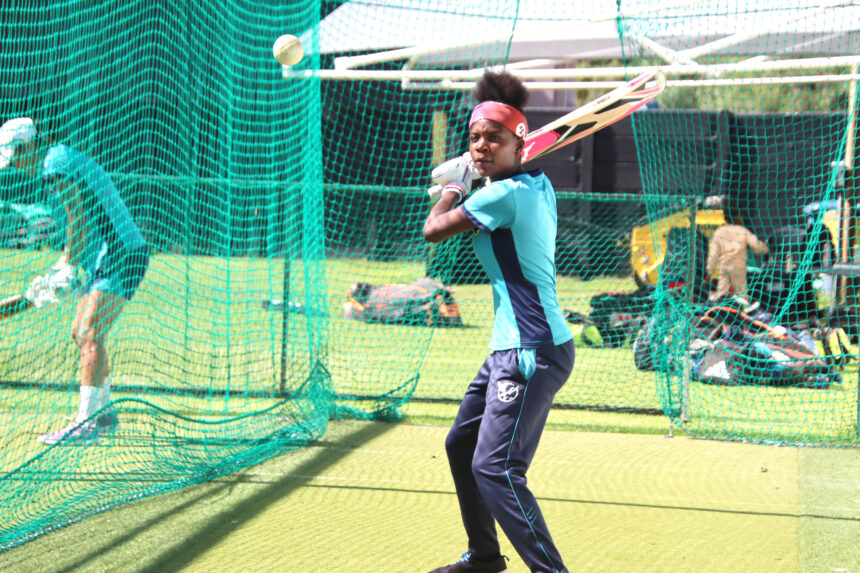Mekelye Mwatile’s journey into cricket began at an early age. Despite facing challenges like time management and gender biases, she learned to balance her training with schoolwork, while finding motivation through her coaches’ wise words.
How did you first get into cricket, and who inspired you to pursue it professionally?
I kicked off my cricket journey when I spotted my big sister Wilka,having an absolute blast at my previous primary school with her senior classmates. They looked like they were having the time of their lives, and I thought, “I want in on that fun.”
So, I picked up a bat and joined the crew. Initially, I played just for the sheer joy of it. But everything changed when I saw Wilka make the national team. The idea of travelling and competing seriously lit a fire under me. That’s when I realised it was time to buckle down and fight for my own spot on the national team.
What were some of the biggest challenges you faced when starting out in cricket?
The challenges were real. One of the biggest hurdles was time management. We played cricket every chance we got – before class, during break, and even after school. I was so immersed in the game that I struggled to find time for myself. At one point, my school performance dipped, which had me worried. Thankfully, my sister mentioned that they practised after school. That news was like a ray of sunshine. I began to look forward to those practices, and I started focusing on my schoolwork during school hours.
How do you balance your training and personal life?
Balancing my training and personal life is like a well-choreographed dance. I’ve got a daily schedule that keeps me on track. Mornings are all about school, and afternoons are my dedicated training time. A typical day? Well, I rise bright and early for a 5km jog around the neighbourhood – gotta get those legs moving. After a little personal downtime, it’s practice from 15h00 to 18h00, followed by a gym session until 19h30. I love how it all fits together.
How do you stay motivated during a tough match?
Staying motivated during a tough match is like trying to lift a mountain. Sometimes it stings, especially when I am bowling, and someone clouts a six off me while we’re defending our score. But then I remember my coach’s wise words: “There will be bad days for others, but don’t let that stop you from doing your job right.” Dwelling on the past isn’t an option, and I keep reminding myself: “Next ball!”
What is your specific role on the team, and how do you prepare for it?
I am the bowler-extraordinaire. I have one of those rare left-arm bowling actions known as a “chinaman.” It’s special. Teamwork is crucial in cricket, and I build it with my teammates through simple yet effective methods. Our coach often pairs us up during training sessions for drills, and on Fridays, we hold team talks to appreciate each other’s improvements, or just hang out and have fun together.
Have you faced any gender-based challenges in your career? If so, how have you overcome them?
Absolutely! Gender-based challenges were part of my early journey. My coastal coach back then would select teams based on skill, mixing boys and girls. I was the only girl on the boys’ team, and there was this one match against a tough opponent, where I asked the captain to let me bowl. He shot me down, saying, “You’re a girl; the batsman will just hit your balls for boundaries.” Talk about a confidence-buster. But I told my coach, who was watching from the boundary, and he let me take the ball. I bowled like a whirlwind and snagged three wickets in that over. Talk about vindication.
What has been the proudest moment of your career so far?
Without a doubt, scoring my first 100 at 16 years old. It felt like I’d climbed a mountain. My role model? Virat Kohli. It’s not just his cricketing prowess that inspires me but also his incredible attitude toward life and the game. He’s raised the bar for fitness, discipline and mental toughness, and that’s essential in both sport and life!
Where do you see women’s cricket in the next five years?
I envision sponsorships providing athletes with solid incomes, granting better access to training facilities, gear, and all the essentials. To contribute to the growth of cricket in my country, I am considering coaching young players, organising local tournaments, supporting clubs, promoting the sport on social media, or even volunteering for development programmes. Each effort counts. We can nurture talent and spark interest, making a meaningful impact on cricket’s future. Women’s cricket has come such a long way since then. I still remember practising on a tennis field littered with stones. Now, we’ve got a fantastic training facility with nets and proper pitches. More girls are joining the sport, and it’s thrilling to see. I am confident we’ll soon have a team that qualifies for the World Cup.
What do you enjoy doing when you’re not playing cricket?
When I’m not on the pitch, you can find me diving into a good book, binge-watching movies or shows, jamming to music, cooking up a storm, or simply going for walks or runs. I love spending time with friends and family, or trying out new sports and games, and don’t forget photography, painting, travelling or even learning new skills like cooking or playing an instrument. These hobbies bring me so much joy.
Message for all
For young girls entering the sport, my advice is simple: keep pushing, show up for practice – because that’s where everything starts! Know what you want to improve and ask for help if you’re struggling. Self-discipline and respect are key.


